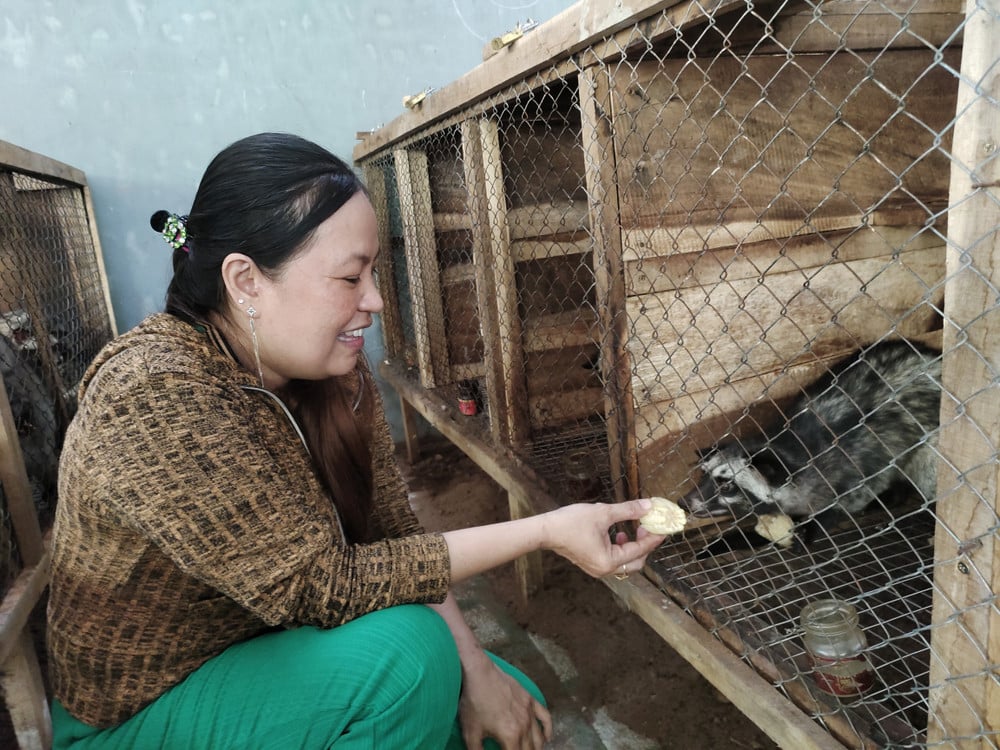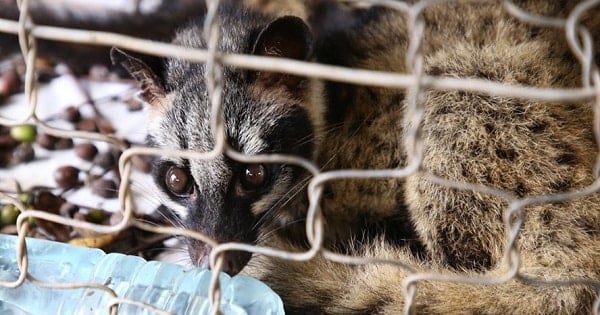December 5, 2025 | 11:37 GMT +7
December 5, 2025 | 11:37 GMT +7
Hotline: 0913.378.918
December 5, 2025 | 11:37 GMT +7
Hotline: 0913.378.918
The study, ‘Seroprevalence and risk factors of hantavirus and HEV exposure among wildlife farmers in Vietnam,’ was conducted under the CGIAR One Health Initiative by an international research team that included the International Livestock Research Institute (ILRI), Uppsala University, the Vietnam National Institute of Veterinary Research (NIVR), and other national and global partners.
The study assessed serum samples from 207 wildlife farmers of four wildlife species (bats, civets, bamboo rats and wild boars) in the Lao Cai and Dong Nai provinces and found that 8.7% (18 individuals) tested positive for hantavirus IgG antibodies, with signs of recent hantavirus exposure in 1.9% (4 individuals) of participants and 26.7% (55 individuals) tested positive for HEV IgG antibodies, indicating previous exposure to the hantavirus and HEV.

These findings underscore the urgent need for targetedpublic health interventions to mitigate zoonotic disease risks in this sector. Photo: Cong Tri - TTXVN.
The analysis reveals that certain groups are more vulnerable to exposure, particularly men, the elderly, and individuals who frequently consume wild animal meat that has not been thoroughly cooked. Several documented cases also showed that while protective equipment was used during contact with animals, it was not applied correctly, thereby diminishing its preventive effectiveness and leaving gaps in protection.
Furthermore, residents in mountainous regions or areas with high levels of biodiversity are considered to face significantly greater risks compared to other localities. This heightened vulnerability is closely tied to the nature of their livelihoods, where wildlife farming and related practices continue to serve as a crucial source of income. In many communities, raising or trading wild animals is not only a means of economic survival but also a deeply rooted cultural practice, which in turn increases the likelihood of exposure and complicates efforts to reduce the associated health risks.
According to Dr. Bui Nghia Vuong, Head of the Department of Virology at the Vietnam National Institute of Veterinary Research, this study provides critical evidence of the risk of zoonotic disease exposure among wildlife farmers. It serves as a scientific basis for strengthening surveillance systems and implementing protective measures to safeguard communities.

Wildlife farming remains an important source of livelihood for highland communities. Photo: VAN.
In Vietnam, the farming of wild animals for food consumption and commercial trade is still relatively widespread. Such practices often involve frequent and close contact with wildlife species that naturally harbor pathogens capable of crossing over into humans. This direct and repeated interaction substantially raises the infection risk faced by wildlife farmers.
“Because animal farming is closely tied to people’s livelihoods and provides an essential source of income, it must be carefully managed to reduce health hazards. Policies that encourage safe farming environments and responsible practices are therefore key to protecting both humans and livestock,” cautioned Professor Johanna Lindahl, a zoonotic disease expert at Uppsala University.
Ms. Nguyen Thi Thanh Ha, the study’s lead author and a doctoral researcher at Uppsala University and ILRI, stressed that the research results call for urgent public health interventions. These include not only improving hygiene standards and biosecurity measures in farming systems but also promoting awareness campaigns to change risky behaviors.
“Television, radio, newspapers, and social media play an essential role in helping communities understand the risks and adopt appropriate preventive measures,” Ms. Ha emphasized.
The Hantavirus is naturally harbored in rodent species and can be transmitted to humans through direct contact with infected animals or by inhaling dust particles contaminated with the virus. Once contracted, it can cause severe illnesses such as hemorrhagic fever with renal syndrome or hantavirus pulmonary syndrome, both of which can lead to high fatality rates in certain cases.
By contrast, the Hepatitis E virus primarily spreads through the gastrointestinal route, most often via drinking water and food contaminated with the virus, or by consuming undercooked meat from infected animals. It is known to cause acute hepatitis and is particularly dangerous for vulnerable populations, especially pregnant women.
These two viruses pose significant threats to public health, especially in contexts where wildlife farming remains common across many localities in Vietnam. Frequent and close contact with animals that may serve as reservoirs of these pathogens amplifies the risk of cross-species transmission.
To mitigate these dangers, the research team strongly recommends strengthening public health interventions. This includes improving environmental hygiene and sanitation, ensuring the safety of food and water sources, promoting the correct and consistent use of protective equipment, and advancing sustainable policies for wildlife farming management.
Translated by Phuong Linh

(VAN) As of 2025, the ASEAN region has a total of 69 ASEAN Heritage Parks recognized across its 10 member states. Among them, Viet Nam contributes 15 ASEAN Heritage Parks.

(VAN) Yok Don National Park has high biodiversity with numerous endemic plant and animal species, and it is also the only dipterocarp forest ecosystem conservation area in Viet Nam.

(VAN) Viet Nam and Brunei signed two important MOUs on fisheries and IUU, expanding cooperation in agriculture, the environment, and Halal exports, aiming to substantively implement joint projects.

(VAN) The Viet Nam Coconut Association worked with the International Finance Corporation (IFC) and businesses to promote the supply chain, enhance competitiveness, and develop the coconut industry sustainably.
![Hue aims for Net Zero: [2] Pioneering low-emission tourism](https://t.ex-cdn.com/nongnghiepmoitruong.vn/608w/files/huytd/2025/12/04/0633-dulichzero-4-095634_236-161125.jpg)
(VAN) The ancient capital of Hue has developed Net Zero tourism products and models, aiming to reduce carbon emissions and pioneer the establishment of Viet Nam's green tourism destination.

(VAN) C.P. Viet Nam has announced the successful completion of its goal to plant 1.5 million trees during the 2021-2025 period, a key milestone within company's long-term ESG strategy and its roadmap for emission reduction.

(VAN) This is an initiative of MAE aimed at creating a unified coordination mechanism to implement agricultural cooperation programs with developing countries.